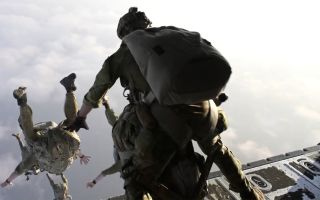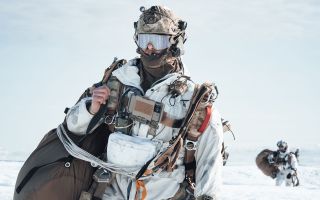Exclusive: Army divers prioritise training on waterway security and infrastructure
Army divers have been told to focus their efforts on how they can enable troops to successfully cross waterways in Europe and to practise inspecting underwater infrastructure to assess whether vessels could safely enter or leave ports and harbours.
More than 130 divers from across the Army travelled to Minden in Germany for Exercise Submerged Shield, which takes place annually.
This year, it involved real-life tasks, including inspecting underwater infrastructure.
"We need to get better at crossing waterways, crossing wide gaps, providing mobility for our forces and enabling counter mobility when we need to," Army Diving Senior Operator Lieutenant Colonel Tony Pick told BFBS Forces News.
"Movement across water is absolutely key in history, showing that and more recently in Eastern Europe, there's been a number of examples where denying a waterway has caused armies to stop, which then makes them a sitting target."
Personnel were practising their skills in assessing underwater infrastructure on a real-life task for a German harbourmaster.
"None of the divers, I believe, would have worked on underwater rail infrastructure before.
"This is completely new, and it absolutely ties into what we need to achieve. This is port enablement," Staff Sergeant Lee Fantham, the Unit Diving Officer, Infrastructure Support Diving Team, said.
"So, if we move into a theatre anywhere, we can absolutely inspect the infrastructure and say, right, we're good to go for using this type of system, which is recovering or deploying vessels.
"Or equally, we could inspect the harbour wall and say, right, this ship can come in and start unloading and offloading equipment."
A few minutes after diving down to examine the underwater rails, Sergeant Sean Melville said: "The boat is getting launched tomorrow, so the harbourmaster wants to know the state of the rails so they can safely launch boats out.
"There was some growth on the rail at 1.5m depth, so that could be some barnacles or something attached to that.
"So, when they do the further inspection, they might need to be pulling some of that off the rails so they can send it down."
Divers travelled from units across the Army and, in the tasks they faced, they mixed up the teams to help them share their expertise.
With Nato shifting to a wartime mindset, these divers know their skills will be essential if the worst happens.
And they know just how valuable every second of this training is, and how vital it will be to draw on if, or when, the time comes.








